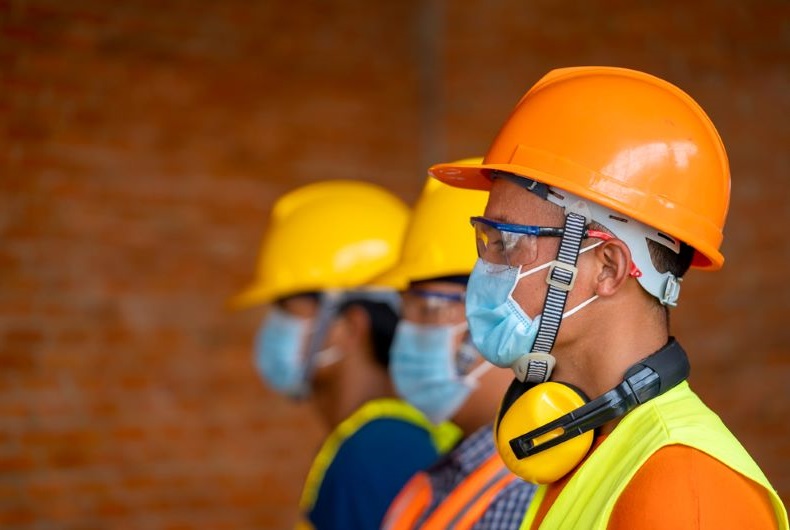Labour Law
-
 In Trustees for the Time Being of the East London Hebrew Congregation v Galperin and Others [2022] 4 All SA 224 (ECLD), continued occupation of property, despite a notice to vacate following the termination of employment.
In Trustees for the Time Being of the East London Hebrew Congregation v Galperin and Others [2022] 4 All SA 224 (ECLD), continued occupation of property, despite a notice to vacate following the termination of employment. -
 As companies prepare for the December break, questions about bonuses, leave, working on public holidays, misconduct and other issues naturally come to the fore.
As companies prepare for the December break, questions about bonuses, leave, working on public holidays, misconduct and other issues naturally come to the fore. -
 In Association of Mineworkers and Construction Union and Others v AngloGold Ashanti Ltd t/a AngloGold Ashanti and Others 2022 (8) BCLR 907 (CC), substantive requirements for lawful secondary strikes.
In Association of Mineworkers and Construction Union and Others v AngloGold Ashanti Ltd t/a AngloGold Ashanti and Others 2022 (8) BCLR 907 (CC), substantive requirements for lawful secondary strikes. -
 In National Education Health and Allied Workers Union v Minister of Public Service and Administration and Others and related matters 2022 (6) BCLR 673 (CC), Cabinet approval does not have the effect of authorising the Minister to legally conclude a collective agreement if it is in contravention of the provisions of Public Service Regulations 78 and 79.
In National Education Health and Allied Workers Union v Minister of Public Service and Administration and Others and related matters 2022 (6) BCLR 673 (CC), Cabinet approval does not have the effect of authorising the Minister to legally conclude a collective agreement if it is in contravention of the provisions of Public Service Regulations 78 and 79. -
 There is a fine line between extended absenteeism and desertion in the workplace. Desertion is often difficult for employers to prove, but they can still terminate a contract of employment by way of repudiation if the correct process is followed.
There is a fine line between extended absenteeism and desertion in the workplace. Desertion is often difficult for employers to prove, but they can still terminate a contract of employment by way of repudiation if the correct process is followed. -
 In National Union of Mineworkers obo Masha and Others v Samancor Limited (Eastern Chromes Mines) and Others 2021 (10) BCLR 1191 (CC), LAC erred in departing from the general rule that losing parties in labour matters should not be ordered to pay the successful parties’ costs, unless there were reasons.
In National Union of Mineworkers obo Masha and Others v Samancor Limited (Eastern Chromes Mines) and Others 2021 (10) BCLR 1191 (CC), LAC erred in departing from the general rule that losing parties in labour matters should not be ordered to pay the successful parties’ costs, unless there were reasons. -
 Authority for the position that whilst compensation is generally regarded as solatium, factors related to actual patrimonial loss may be relevant to determining compensation that is just and equitable.
Authority for the position that whilst compensation is generally regarded as solatium, factors related to actual patrimonial loss may be relevant to determining compensation that is just and equitable. -
 The principle that individual rights are outweighed in certain circumstances is well established in our law, as indicated by a number of judgments which confirm that an individual’s right to refuse being vaccinated in terms of section 12(2)(b) of the Constitution is not cast in stone.
The principle that individual rights are outweighed in certain circumstances is well established in our law, as indicated by a number of judgments which confirm that an individual’s right to refuse being vaccinated in terms of section 12(2)(b) of the Constitution is not cast in stone. -
 The publication of the revised Consolidated Directions on Occupational Health and Safety Measures in Certain Workplaces on 11 June 2021, does not mean that employers are now entitled by law to subject employees and independent contractors to mandatory vaccinations.
The publication of the revised Consolidated Directions on Occupational Health and Safety Measures in Certain Workplaces on 11 June 2021, does not mean that employers are now entitled by law to subject employees and independent contractors to mandatory vaccinations. -
 The developing law has been and is still being outpaced by the coronavirus pandemic, but it is quite apparent that while the employer bears the obligation to ensure that the workplace is safe, the employee also has corresponding obligations.
The developing law has been and is still being outpaced by the coronavirus pandemic, but it is quite apparent that while the employer bears the obligation to ensure that the workplace is safe, the employee also has corresponding obligations. -
 We know that employers must provide a safe workplace. But what are his rights, and what demands can he make on employees in implementing and managing the containment of the COVID-19 pandemic?
We know that employers must provide a safe workplace. But what are his rights, and what demands can he make on employees in implementing and managing the containment of the COVID-19 pandemic? -
 A Temporary Financial Relief Scheme has been established to assist the more than 75 000 workers who are receiving either reduced pay or no pay. Read here.
A Temporary Financial Relief Scheme has been established to assist the more than 75 000 workers who are receiving either reduced pay or no pay. Read here. -
 The answer to whether employers can force their employees to get vaccinated against Covid-19 involves weighing up individual constitutional rights against those of the public interest, consent, and in the absence of specific legislation, to inform them of the benefits.
The answer to whether employers can force their employees to get vaccinated against Covid-19 involves weighing up individual constitutional rights against those of the public interest, consent, and in the absence of specific legislation, to inform them of the benefits. -
 South African companies and organisations considering using demotion as an alternative to retrenchment need to bear in mind several labour law considerations with regard to its context and correct implementation.
South African companies and organisations considering using demotion as an alternative to retrenchment need to bear in mind several labour law considerations with regard to its context and correct implementation. -
 The general requirements for a fair dismissal based on an employer's operational requirements are to be found in section 189 of the LRA. However, section 189A provides for specific procedures and remedies for instances of large-scale retrenchment. The similarities and differences between these two sections therefore need to be considered.
The general requirements for a fair dismissal based on an employer's operational requirements are to be found in section 189 of the LRA. However, section 189A provides for specific procedures and remedies for instances of large-scale retrenchment. The similarities and differences between these two sections therefore need to be considered. -
 In the third of four articles which look at what happens when parties refuse to participate virtually, Dr Hilda Grobler discusses the findings of the Labour Court where a party failed to attend her disciplinary hearing by linking up. She was Zoomed out of a job.
In the third of four articles which look at what happens when parties refuse to participate virtually, Dr Hilda Grobler discusses the findings of the Labour Court where a party failed to attend her disciplinary hearing by linking up. She was Zoomed out of a job. -
 In the fourth of four articles which look at what happens when parties refuse to participate virtually, Dr Hilda Grobler discusses why there are no valid reasons for hearings not to be held virtually, in order to ensure that courts and other fora remain functional.
In the fourth of four articles which look at what happens when parties refuse to participate virtually, Dr Hilda Grobler discusses why there are no valid reasons for hearings not to be held virtually, in order to ensure that courts and other fora remain functional. -
 In the first of four articles which look at what happens when parties refuse to participate virtually, Dr Hilda Grobler summarises responses from the Supreme Court of Appeal (SCA) and the High Court to litigants who believe they have the right to insist on face-to-face hearings. They do not.
In the first of four articles which look at what happens when parties refuse to participate virtually, Dr Hilda Grobler summarises responses from the Supreme Court of Appeal (SCA) and the High Court to litigants who believe they have the right to insist on face-to-face hearings. They do not. -
 In the second of four articles which look at what happens when parties refuse to participate virtually, Dr Hilda Grobler discusses what happens when parties refuse to participate virtually in retrenchment consultations. It is done with reference to what the Labour Court had to say when FAWU claimed procedural unfairness when the consultation proceeded in its absence.
In the second of four articles which look at what happens when parties refuse to participate virtually, Dr Hilda Grobler discusses what happens when parties refuse to participate virtually in retrenchment consultations. It is done with reference to what the Labour Court had to say when FAWU claimed procedural unfairness when the consultation proceeded in its absence. -
 Ten points of interest concerning the necessity to avoid self help and to follow due process in labour disputes are discussed in the light of the recent Labour Court judgment in Mogaladi and Another v Public Protector. And replace the text in the article of No to self-help: follow due process in labour disputes with it.
Ten points of interest concerning the necessity to avoid self help and to follow due process in labour disputes are discussed in the light of the recent Labour Court judgment in Mogaladi and Another v Public Protector. And replace the text in the article of No to self-help: follow due process in labour disputes with it.
 Lexis Nexis
Lexis Nexis